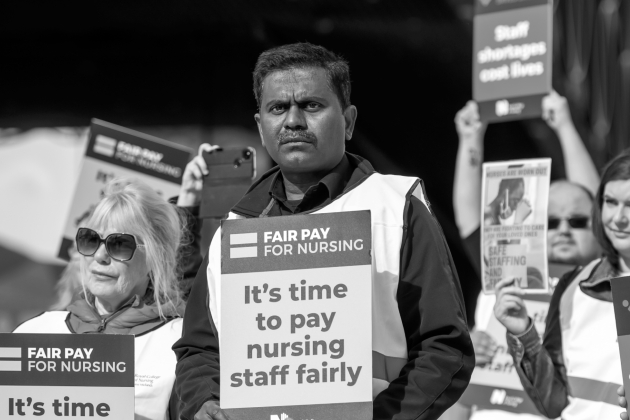If you’re an RCN member employed by an organisation that the RCN has notified of strike action taking place, you can strike.
This is the case even if you didn’t vote in our strike ballot, if you voted against strike action in the ballot, or if you’ve joined the RCN since the ballot closed.
Striking means withdrawing your labour, so not going to work on a day you were due to, unless you’re exempt from the strike through a derogation.
You don’t have to join a picket line, you can stay at home if you want to. But we strongly encourage members to attend picket lines to show their solidarity and be together with other striking nursing staff. We’re confident it’ll be an unforgettable experience and by picketing, even for a short time, you will be showing how strongly you feel about the need for fair pay and measures to improve patient safety.
Strike action attracts a lot of media interest, and this often puts pressure on governments to come to the negotiating table. It’s possible the UK government will increase nursing pay with enough public support, member action and political pressure. You can help us to apply that pressure.
Strike action is a proven way to effect change. Be part of our historic mission by joining in if you can.
I don’t work on a ward or in a clinical role. Can I strike?
Yes, if you’re an RCN member and strike action is happening at your employer. Every member is entitled to strike following a lawful ballot, regardless of their role.
I don’t want to talk to my employer about it in advance. Can I strike?
Yes. You're not required to disclose your trade union membership or intention to strike, but you're encouraged to advise your manager of your decision to strike as this supports the delivery of safe strike action.
I’ve recently started work with an employer where strikes are planned. Can I strike?
Yes, if your employment has started and you’re scheduled to be at work on a strike day, you can and should strike.
I’m not scheduled to work on a strike day. Can I strike?
Striking means not going to work on a day you were due to, so you can only strike if you’re scheduled to work on a day strike action is taking place. However, you can support the strike by visiting a picket line and posting about strike action on social media.
I’m on maternity leave or taking a career break. Can I strike?
No. You can only strike if you’re due to be on duty on a strike day. But you can support strike action in other ways. Perhaps you could provide food and drink for those on a picket line, post about strike action on social media using the hashtag #RCNStrike or talk to your friends and family about the importance of fair pay for nursing.
I’m on long-term sick leave. Can I strike?
No. Unfortunately not. You can only strike if you’re due to be on duty on a strike day. But you can support strike action in other ways. Perhaps you could post about strike action on social media using the hashtag #RCNStrike or talk to your friends and family about the importance of fair pay for nursing.
I’m a student nurse. Can I strike?
You can strike if you’re an RCN member (any category) directly employed by an NHS employer on NHS Agenda for Change terms and conditions. This may include bank contracts, but please check your contract. You must be employed by an NHS employer on NHS Agenda for Change terms and conditions, and not an internal pay or bank system that differs from these.
I didn’t vote in the RCN strike ballot. Can I strike?
Yes, if you’re an RCN member employed by an organisation that the RCN has notified of strike action taking place. It doesn’t matter if you voted or how you voted, you have the right to strike and we urge you to do so.
I voted against strike action in the ballot. Can I strike?
Yes. See answer above.








